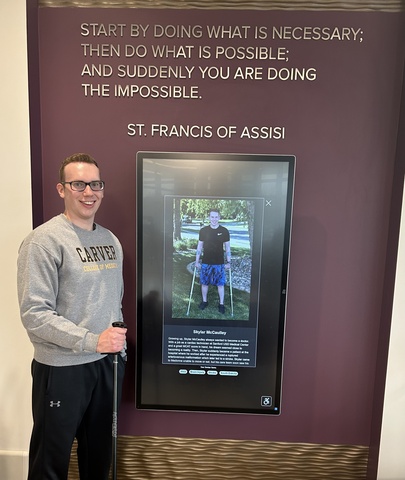Skylar McCaulley has dreamed of being a physician since he was a child. Several members of his immediate family—his father, one sister, and one brother—live with Type 1 diabetes, and witnessing their health care experiences piqued his interest in medicine.
“Observing the impact that their disease had on our family has had an indelible impact on me,” he says.
McCaulley shadowed his younger brother’s pediatric endocrinologist and was fascinated by the experience. In college at the University of Sioux Falls, he participated in research in an exercise science lab, studying the connection between diabetes, estrogen therapy, and physical activity. The research culminated in a publication in the Journal of Applied Physiology. He also co-founded an organization called the Pre-Professional Health Organization to help connect students interested in going into graduate school for health sciences with information about how to apply.
“Later when I worked as a nursing assistant in radiology, I got exposed to all different areas, and I found that I just liked everything,” he says.
He was building the path toward his dream—but then, one day, everything changed.

On August 13, 2021, after a week of “debilitating headaches,” McCaulley visited an acute care center. He was sent to the ER, then admitted to the intensive care unit (ICU). Two days later, he was in a coma, which lasted for three weeks. He was 21 years old.
“When I woke up from the coma, I was unable to eat, drink, move, or speak,” McCaulley says. “I could answer questions by winking. A wink meant ‘yes,’ and my mom explained that if I stared at someone blankly, that meant ‘no.’ That was my only means of communication.”
McCaulley had experienced a cerebellar arteriovenous malformation rupture. He was born with an area of blood vessels in his brain that were—by McCaulley’s description—a “tangled mess,” preventing blood from passing normally from the arteries to the veins in his brain. This caused pressure to build up in the area, bursting the venous walls and causing a sudden, traumatic bleed in his brain.
He spent 51 days in the ICU before he moved to Madonna Rehabilitation Hospital in Lincoln, Nebraska, where he recuperated in inpatient care for 2 1/2 months.
“By the end, I was able to eat and drink with difficulty, and I was slowly starting to move,” he says. “I was walking with a lot of assistance. When I left, I was in a wheelchair most of the time.”
He left inpatient treatment that December and began a months-long journey of outpatient rehabilitation at Madonna and Sanford Hospital. Through speech therapy, occupational therapy, and physical therapy, he regained his functional independence.
“I ended up taking a year off of school and graduated in May 2023,” he says. “I had a lot of people tell me that to experience something so extreme and have it only take one year is incredible.”
August 14, 2023, was McCaulley's first day of medical school classes—and the two-year anniversary of his hospitalization.
“I’ve always been someone who, when I set my mind on something, I want to get it done,” he says. “I decided I wanted to complete medical school. It’s my dream, and I’m prepared to do it.”
Though the brain bleed wasn’t his original motivation for pursuing medicine, it has renewed his commitment to becoming a physician and informed his approach to his medical education.
Having the experience of being the patient and celebrating small joys, like being able to eat something or take a sip of water, is going to help me be more empathetic and caring for the patients I treat in the future.
-Skylar McCaulley
“It’s hard to articulate just how grateful and blessed I feel to have an opportunity to attend an amazing institution like Iowa and study medicine, and to be at this point of my recovery,” he says. “Having the experience of being the patient and celebrating small joys, like being able to eat something or take a sip of water, is going to help me be more empathetic and caring for the patients I treat in the future.”
During his year-long recovery, he worked with internists, neurologists, hospitalists, radiologists, intensivists, and speech, occupational, and physical therapists, to name a few. The varied interprofessional care that he received has grown his interest in a number of medical specialties for his own future career. Though he is more interested in neurology than he was prior to the brain bleed, he still finds himself drawn to endocrinology and caring for patients like his father and siblings someday.
As for his future at the College of Medicine, he looks forward to getting involved with the community at the college.
“I was excited about being around a community of such exceptionally nice people,” McCaulley says. “It stood out to me of all the places I went how kind the people at the University of Iowa are.”
Most of all, he’s looking forward to the academic challenge that medical school will bring.
“I’m someone who really likes challenges," he says.